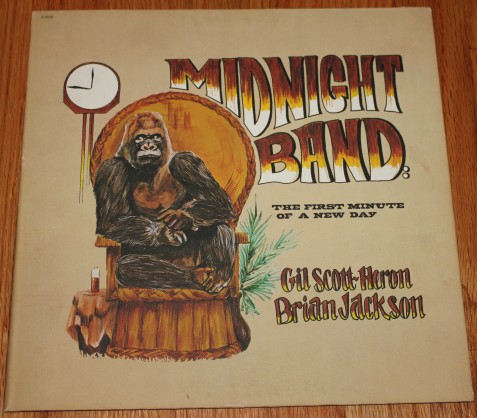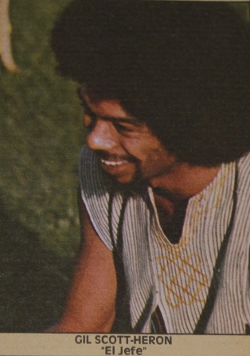Gil Scott-Heron – Alluswe
Gil Scott-Heron – Offering
Gil Scott-Heron – Winter In America
Given that I almost played every single song from this album on the tribute to Gil Scott-Heron, it goes without saying that this is my favorite record of his. “Winter In America” is a close second, with “Pieces Of A Man” coming in third, but this one always comes out on top. Perhaps it’s because this was the record that cemented my love affair with Gil, back in the mid to late-1990s (at least as I remember it now…) I was DJ-ing at Album 88 during a “regular” shift and I’m pretty sure I got a request for Gil Scott-Heron. I’d known the name, heard tracks from him and had a couple of CDs (yes this was when I STILL bought CDs, I was just getting into vinyl back then). I knew “The Revolution Will Not Be Televised,” but at this point hadn’t listened to his material recorded from 1974-1977, which for me is his best work (Winter In America, this album, From South Africa to South Carolina, It’s Your World and Bridges). I’m fairly sure that those records were all out of print and unissued on CD which for me at the time meant they basically didn’t exist. On our vinyl wall at Album 88 we had a compilation of tracks from Gil, that included “Ain’t No Such Thing As Superman.” The song was so much deeper and more soulful than anything I’d heard previously from Gil that I became obsessed with tracking down the album it came from which eventually led me to The First Minute Of A New Day.
Over the years, as I tracked down the rest of Gil’s catalog, this record was the one I always kept coming back to. Thinking about it now, in these days since Gil’s passing, I still regard it as his best work. The record was recorded on the heels of his most popular success, “The Bottle,” which moved Gil and his band from the artist controlled Strata East to the same label as Barry Manilow, Arista records. You’d think that kind of change would have spelled an end to Gil’s social commentary, spiritual soul jazz leanings and fiercely strident vocal stances, but instead the opposite happened. The music, the band and the man all were more focused on this album. The music on “First Minute” could and should be rightly described as a sequel to “Winter,” and like the “Empire Strikes Back,” it is a stronger statement than the prior record. With “Liberation” and “Guerrilla,” not to mention the cover art, Gil and his group laid down lyrics that would be unthinkable in 2011 for a mainstream artist, but were firmly in line with Black liberation rhetoric of the time. “Pardon Our Analysis (We Beg Your Pardon),” continues the truth-telling Gil started on the “H2O Gate Blues,” “Must Be Something,” focuses people made apathetic to keep on pushing for freedom, while “Ain’t No Such Thing As Superman,” gets people focused on the reality of social change and hero worship. But the three songs that standout to me above the rest are the three I’ve chosen here.
“Offering” opens up the album in a fitting fashion. The song sets a deeply spiritual tone and presents music, the particular sounds provided by Gil and the Midnight Band as well as all conscious “healing” sounds, as something that links us together in the present with our past and those who will come in the future. When I returned to radio at KCRW after a 3+ year absence I knew that this was the song I wanted to open with, as my own statement of purpose for what I’d try to accomplish in my return, something that I feel more successful doing now on my show at KPFK.
You would think that “Winter In America” would have found its way onto the album with its title, but in some ways it seems better placed here. It’s a sad statement on the place of America in the wake of the 1960s, a decade that held such promise, but had so few of the promises truly fulfilled, partially because as Gil notes, “all of the healers have been killed or betrayed.” It’s a bit frightening to think how similar the period of time we are currently living in sounds like this song. I often wonder why they aren’t more protests connected to the many many injustices that occur in America and elsewhere, put perhaps it’s because as Gil says here, “ain’t nobody fighting, cause nobody knows what to save…”
Finally we have “Alluswe,” my single favorite track from Gil Scott-Heron. In contrast to the suspicion, regret and resignation that marked “Peace Go With You Brother,” on Winter In America, “Alluswe” is Gil’s attempt to bring wayward brothers back to the table. It’s a touching affirmation that where ever we go, there remains a place with those who know us best and love us most. It’s a song that I’ve sung countless times and been nearly brought to tears over the sentiment it expresses.
Gil Scott-Heron – “Alluswe”
Like the waves he’s got to ride on,
On the sea he must command,
Like the answers to every question,
That’s what he need understand,
Black man come down and sit beside us,
You can share all we that we have,
And like the stage he’s got to play on,
Life is a role he’s pinning down,
Life attracts him just like a magnet,
Or was that, or was that the other way around.
Black man come down, come on down and sit beside us,
You are welcome to all we own,
Outside the walls and in the corners,
Of the rooms, where we live,
Love is stronger with every heartbeat,
And it’s love we’ll gladly give,
Just come on down and sit beside us
Can your mind believe your heart?
Black man come down, yeah come on down,
Come down
The song seems like a plea, not just for specific men, perhaps artists, to join with Gil in a movement focused on liberation and uplift, but for black men that feel they are lost as they make their way in a world that does not see them as deserving of the positions they may occupy or that they strive to occupy. I feel like it’s Gil’s most passionate and strongest vocal performance, the best song he ever wrote and will forever be my lasting memory of him.
Rest in peace Gil,
Michael



One Reply to “Dig Deep: Gil Scott-Heron and Brian Jackson – The First Minute Of A New Day – Arista (1974)”